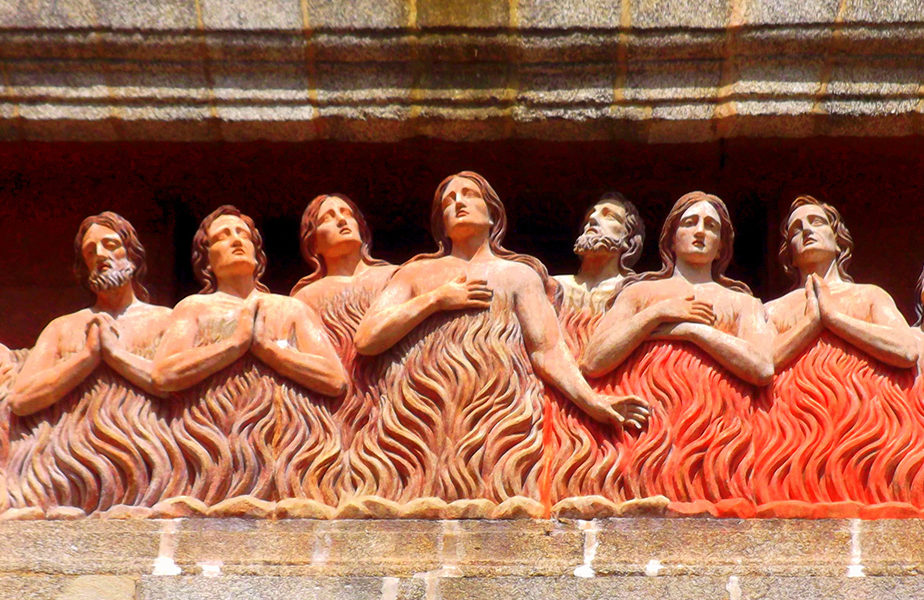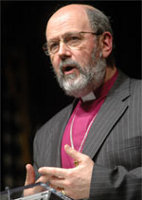Souls are on the way out. Not just in our culture or in science, where some Christians may suspect “naturalism” as the culprit, but souls are on the way out of our Bibles. This is because of the ways in which our translations are getting better at conveying what was originally intended. In the King James Version of the Bible, translated in 1611 and the mainstay for Protestants until the 20th century, the English word “soul” appears 537 times. The New American Bible (1986) features the word 171 times, the NIV (1984) features it just 139 times, the NRSV (1989) features it 252 times, but that includes the Deuterocanonical books, and even the ESV (2001), which hearkens back to older more literal translations, features the word just 281 times. The difference is not because of any difference in the manuscripts that these versions are using but because of a better understanding of what the Hebrew and Greek words actually mean.
Tag: soul Page 1 of 2

What difference does it make if the Bible teaches we are physical creatures, rather than dual body-soul beings? How does that impact on anything else we believe as Christians? From gender identity to mental health more generally, to salvation, the way we view human nature has a profound impact.
Podcast: Play in new window | Download

Did Jesus say that believers would never ever die, indicating that even when their bodies die, they will live on with him in glory? You might have heard that, but what if he meant something different, promising that we would be spared the fate of disappearing into death forever?
I get some resistance to the biblical concept that human beings are frail and mortal, “dust of the earth,” that we return to the dust when we die, and that there’s no heavenly life to be had while our bodies lay in the grave awaiting the resurrection of the dead. Sometimes people even pit Bible verses against this biblical idea. One verse at a time, I think we can see that these objections fail, and the overall clear biblical portrait of human nature and death remains intact.
One of those objections comes from a particular interpretation of Jesus’ saying after raising Lazarus from the dead in John 11:25-26:
“I am the resurrection and the life. Whoever believes in me, even though he dies, will live, and whoever lives and believes in me will never die.”
Never die. That gives pause to some people when they consider my view that immortality is received at the resurrection and that the dead are really dead in the grave, not living on as immortal souls. They wonder if this claim by Jesus must mean that if we live and believe in him now, we cannot lie dead in the grave without our souls living on in glory, because we will “never die.” It’s a good question to ponder, but there’s already a reasonable response to this worry, quite apart from the observation I’ll make soon. Jesus is here talking about those who live the new life that he has just referred to: Whoever believes in me, even though he dies, will live – that is, via the resurrection. So when Jesus goes on to say “whoever lives and believes in me will never die,” he’s talking about the life of immortality after the resurrection.

You can only believe in purgatory if you hold a substance dualist view of human beings.
Purgatory is a place that exists according to Roman Catholic Theology, and a number of people who are not Roman Catholic believe in it, too. In Catholic theology, it is a place where you go after death if you are not yet ready for heaven, so that you can receive punishments for the venial sins (the less serious sins, as opposed to mortal sins) that have not yet been dealt with in this life. As Thomas Aquinas put it,
[I]f the debt of punishment is not paid in full after the stain of sin has been washed away by contrition, nor again are venial sins always removed when mortal sins are remitted, and if justice demands that sin be set in order by due punishment, it follows that one who after contrition for his fault and after being absolved, dies before making due satisfaction, is punished after this life. Wherefore those who deny Purgatory speak against the justice of God: for which reason such a statement is erroneous and contrary to faith.
Outside of this historical Catholic understanding of purgatory, others have suggested, not that people need to be punished, but rather that they simply need to be fully sanctified (made holy) before reaching their final state in heaven. Jerry Walls defends this view in his book Purgatory: The Logic of Total Transformation. In public conversations, Dr Walls has remarked that while no doubt the sinful human desire is to have total transformation all at once, the reality is that sanctification is a process that takes time, hence purgatory.
I do not believe in purgatory, but I will not here argue that purgatory does not exist. Instead, I will just make one observation: To believe in purgatory presupposes mind-body substance dualism.

If you hold a materialist view of human nature, can you still hold an orthodox view of Jesus as God incarnate?
The short answer: Yup.
Podcast: Play in new window | Download

Might it be true that the gender of some people’s souls doesn’t match the sex of their bodies?
In the ever-driven politics of the language of gender, the word “cisgender” has been forged. Without harping on too much about it, it’s a word that, in my view, has been created in part to destabilise the notion of “normal” as far as gender goes, so that what most of us took to be normal until now can be spoken about as simply one condition among the others. To be “cisgender” is to have physical makeup – including chromosomes but especially including sex organs – so that by examining your physical structure, a person can tell whether or not your gender is male or female.

This episode is a very late addition to the series “In Search of the Soul,” looking at the various options that exist in philosophy of mind.
In the original five part series I was very conscious of the fact that I was leaving out the view of Aristotle and Thomas Aquinas, and this addendum is my penance for that fact. As promised in the episode, here are just a few suggestions for further reading, from authors who defend “hylemorphic dualism.”
David Oderberg, Real Essentialism
David Oderberg, “Hylemorphic Dualism” in Ellen Paul, Fred Miller and Jeffrey Paul (eds), Personal Identity
Edward Feser, Philosophy of Mind: A Beginner’s Guide
Podcast: Play in new window | Download
UPDATE: Here the whole series, now that it is complete: Part 1 Part 2 Part 3 Part 4 Part 5 Revisited

He’s right about a lot of things, but soul sleep isn’t one of them.
Tom Wright’s scholarly writing on the biblical teaching on the resurrection of the dead is praiseworthy for a number of reasons. He has alerted the evangelical community to the unfortunate way in which popular theologies of “going to heaven” are eclipsing the biblical hope of the resurrection to eternal life. But he does have one major weak spot, in my view, and that is the rather poor treatment of the doctrine of “soul sleep.” Soul sleep is the view that people do not experience any conscious intermediate state of waiting between death and resurrection. They are wholly dead until God steps in and raises them back to life.

Although I’m familiar with the view that the Apostle Paul is relating an “out of body experience” at the outset of 2 Corinthians 12, I’m pretty sure that he is not. That’s partly because I think human beings are material, so I don’t think that such events are even possible, but it’s also because the evidence for this claim about the meaning of this passage is pretty weak. I’ll explain why I say this.

Every Christian who decides on a stance to take on the mind-body issue is going to have to live with the fact that there will be certain “problem texts” in the Bible that appear to conflict with the position they take. As a physicalist, I think there is a very small number of such texts for my view, and I think there are plausible explanations for all of them (for example Jesus’ words to the criminal on the cross Luke 23:43, which I discussed recently). What one hopes to do is to settle on a view that has fewer problems than all others, problems that have an explanation in sight.
I think that traditional Cartesian/platonic dualism has a real problem, therefore, when it comes to 1 Corinthians 15, as I think it contains a problem for dualism – a problem with no real solution that I can see. The chapter is a decent size, so I won’t reproduce it here, but go ahead and read it first to make sure I’m representing what it says faithfully. The subject is the resurrection of the dead, and it arises because some of those in the church in Corinth had said that there will be no resurrection. The Apostle Paul makes a number of comments on this, one of which concerns my point here. In doing so he indicates that he cannot possibly have been a dualist.

